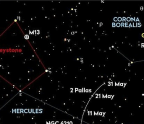Q&A WITH A GALAXY EVOLUTION SCIENTIST
May 19, 2022
2 minutes

Melissa Brobby interviews Joanna Piotrowska
How are supermassive black holes in the centres of galaxies preventing the birth of new stars?
When gas falls onto a supermassive black hole, it settles into an accretion disc due to the angular momentum present in the system. Matter in these accretion discs becomes hot, reaching temperatures of above one million degrees Centigrade. This hot gas emits high-energy
You’re reading a preview, subscribe to read more.
Start your free 30 days





